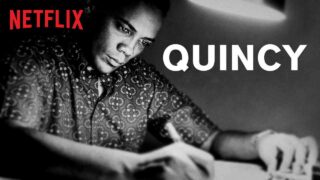The Netflix original film Quincy isn’t just a great documentary about Quincy Jones’ prolific music career. It’s a great reminder that, as an icon, Quincy’s reach and the scope of his work went far beyond entertainment and into social justice and the ongoing inspiration of generations.
Whatever you conjure in your mind when you read about Quincy Jones on the page or in this post, is just a fraction of what he has accomplished: over 2,900 songs recorded; more than 300 albums recorded; 51 film and television scores; more than 1,000 original compositions netting 79 Grammy nominations and 27 Grammy awards; and standing as one of only eighteen (as of this writing) E.G.O.T. winners, meaning he has an Emmy, Grammy, Oscar, and a Tony Award.
This documentary does lay out his rise from Chicago into the music industry, and then further afield in entertainment through film and television scores, before going into producing and publishing.
But inside himself, the creation of all of this inspiring work comes from control.
“I had no control over where I lived, no control over my sick mother. I couldn’t control the angry whites who still called me ‘nigger’ when they caught me alone on the street. But music was one thing I could control. It was the one thing that offered me my freedom.”
However, that control wasn’t always his. In a short conversation with his daughter Rashida, who does a portion of the filming of the documentary, this conversation takes place;
Rashida: Dad, how do you deal with your ego and your art?
Quincy: You know… you need confidence, sure. That’s… I’m not denying that.
Rashida: Yeah.
Quincy: But the… an ego is usually just, uh… overdressed… insecurity. I think you have to dream so big that you can’t get an ego. ‘Cause you’ll never fulfill all those dreams. There’s always more to come and learn.
 Quincy reached a great deal of big dreams, but it’s not always so straightforward. He states matter of factly, “I know it’s a sickness, in a way. You can call it ‘workaholic’ or whatever it is, but it’s, uh… it’s the only way I know.” I, for one, connect with him on that level. But he has taken his “sickness” and conquered entertainment to leave a lengthy legacy.
Quincy reached a great deal of big dreams, but it’s not always so straightforward. He states matter of factly, “I know it’s a sickness, in a way. You can call it ‘workaholic’ or whatever it is, but it’s, uh… it’s the only way I know.” I, for one, connect with him on that level. But he has taken his “sickness” and conquered entertainment to leave a lengthy legacy.
And how do we determine legacy for such legendary individuals who are still alive? In the case of this documentary, it’s in creating an event and inviting everyone you know. In this instance, that happens to be a who’s who across entertainment – music, television, movies, on the mic, behind the board, on screen, and behind the camera.
If you know Quincy’s work, you’ll appreciate it even more of it by watching this documentary. If you don’t know Quincy, then you’re about to get a crash course in Quincy, and you’ll know more than you think. Everyone has been touched by Quincy’s legacy. Everyone.
Read the Secret File of technical information and quotes from Quincy.